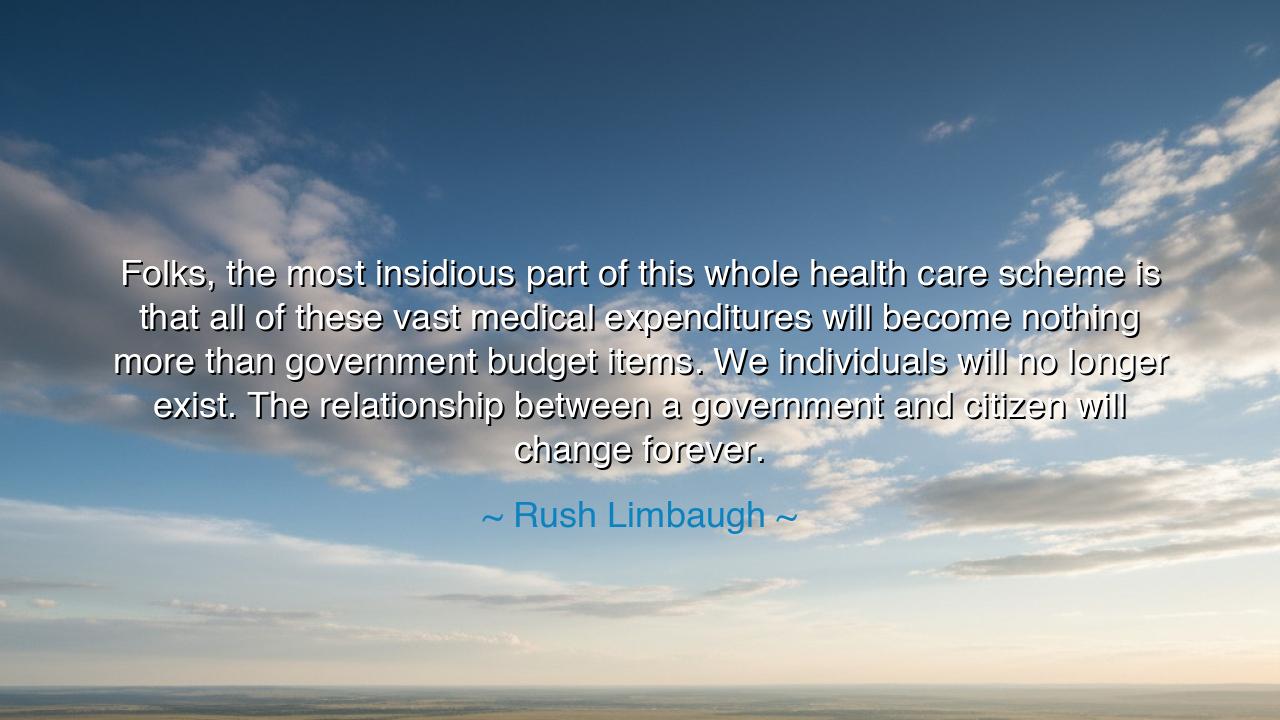
Folks, the most insidious part of this whole health care scheme
Folks, the most insidious part of this whole health care scheme is that all of these vast medical expenditures will become nothing more than government budget items. We individuals will no longer exist. The relationship between a government and citizen will change forever.






The words of Rush Limbaugh—“Folks, the most insidious part of this whole health care scheme is that all of these vast medical expenditures will become nothing more than government budget items. We individuals will no longer exist. The relationship between a government and citizen will change forever”—resound with the urgency of warning, as though the speaker stands on the precipice of history, gazing into a future of altered sovereignty. Beneath the rhetoric lies a profound meditation on individual liberty, autonomy, and the sacred bond between citizen and state. Limbaugh’s declaration is not merely political; it is an ancient anxiety, echoing through the corridors of time: what becomes of freedom when the mechanisms of survival are controlled by the hands of power?
To understand the origin of this caution, one must place it in the context of early twenty-first-century America, a nation debating the scope and role of health care. Limbaugh, a conservative commentator, feared the transformation of personal responsibility into statistical ledger items, where human life is measured not by its intrinsic value, but by its cost to the state. In this vision, medical care—once a personal, familial, or communal trust—becomes a line in a budget, and citizens are no longer individuals with rights and voices, but numbers to be allocated, optimized, or sacrificed. His words reflect a timeless tension: the struggle between centralized authority and the dignity of the individual soul.
The ancients understood this tension well. Cicero, in the Roman Republic, warned that a government that claims to protect all can, through its power, dominate all. When care, security, or sustenance is provided entirely by the state, the citizen becomes dependent, and with dependence comes a subtle erosion of freedom. Limbaugh’s critique channels this ancient wisdom: the danger is not merely financial or logistical—it is moral and spiritual. When humans are reduced to line items, the sacred individuality of life is imperiled, and with it the vital trust between ruler and ruled.
History offers vivid lessons of this peril. Consider the centralized health systems in totalitarian regimes of the twentieth century. In Stalin’s Soviet Union, the state assumed responsibility for all citizens’ welfare, including medical care—but this assumption came at the cost of personal freedom. Hospitals were state-run, care rationed, and the individual’s voice silenced in bureaucratic corridors. Limbaugh’s warning, though hyperbolic in tone, captures this reality: when life is governed by policy rather than personal agency, the relationship between human and state is fundamentally altered.
Yet there is also a caution within his caution. Limbaugh’s concern is not with health care itself, but with the centralization and depersonalization of it. Medicine, in his view, is more than treatment; it is trust, responsibility, and the intimate understanding between person and healer. To convert this sacred bond into a mere line in a ledger is to reduce humanity to an abstraction. Across cultures and centuries, healers have been respected not for bureaucracy, but for fidelity to the individual—an ethos that Limbaugh fears is lost when the individual disappears into the machinery of government.
In reflecting on his words, one sees a broader truth about citizenship and vigilance. Freedom is not granted—it is maintained, nurtured, and defended. When policies encroach upon personal responsibility, the citizen must weigh convenience against liberty, and assistance against autonomy. Limbaugh’s alarm, however politically charged, reminds us that the essence of democracy is the respect for the individual as the foundation of society. Every law, every budget, every program must preserve, not erase, the human being at its heart.
The lesson of this quote, then, transcends political debate. It is a meditation on the balance between care and freedom, between public good and private autonomy. Let us remember that the value of a nation is measured not solely by its wealth or programs, but by the dignity it preserves for each soul within its borders. Dependence must be tempered by empowerment; generosity must be tempered by liberty. Only then can society remain both compassionate and free.
So, my child, carry this wisdom forward: never allow the machinery of governance to eclipse the dignity of the individual. Serve your fellow man, contribute to your community, but guard your autonomy as fiercely as you would your life. When the state offers care, accept it wisely; when it demands submission, question it courageously. For history teaches, as Rush Limbaugh warns, that the line between service and control is thin—and the survival of freedom depends upon our vigilance, our wisdom, and our steadfast respect for the human soul.






AAdministratorAdministrator
Welcome, honored guests. Please leave a comment, we will respond soon